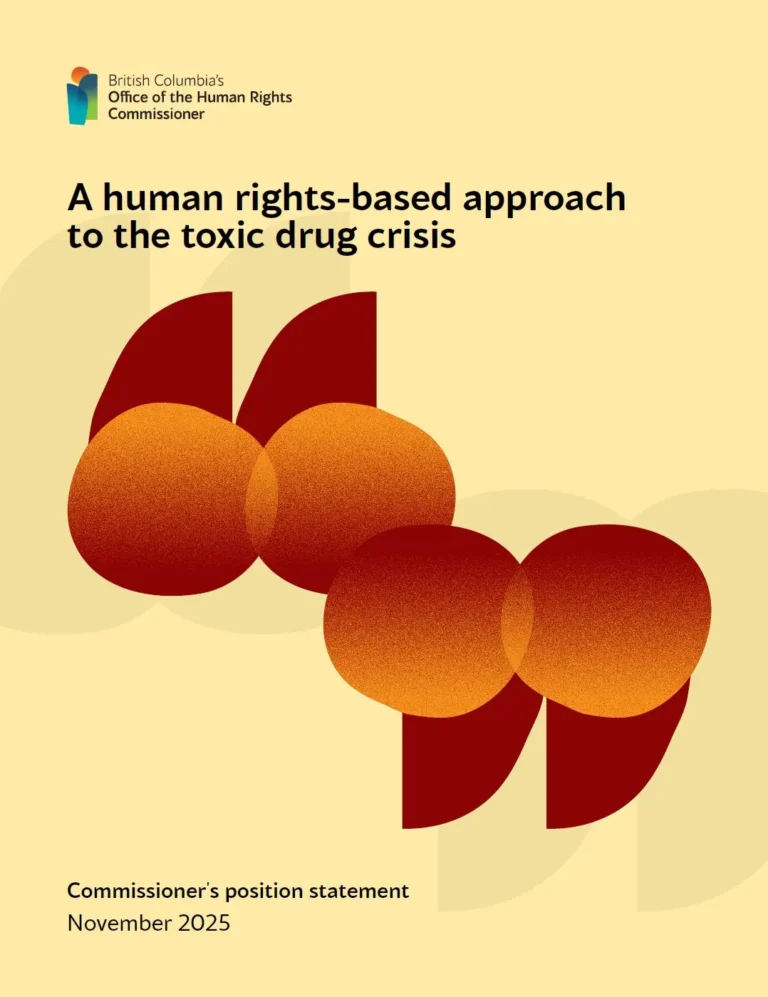This paper lays out the B.C. Human Rights Commissioner’s positions on the toxic drug crisis and calls for an evidence-based response that centres public health and compassion for those impacted.
Download the statement or begin by reading the excerpt below.
If the version available via this page is not accessible for you, please feel welcome to contact our Office to request a printed copy or another format that meets your needs.
Resources
- Press release: Commissioner releases statement on toxic drug crisis, calls on government to put politics aside to save lives (November 13, 2025)
- More from BCOHRC on the toxic drug crisis:
Excerpt
The following is an excerpt from the Commissioner’s position statement.
Since 2016, when B.C.’s Provincial Health Officer declared a public health emergency, over 16,000 people have died from drug poisonings in the province.1 Many others are living with significant brain injuries from toxic drugs.2 Families and communities have lost their loved ones and are seeking solutions that will prevent future deaths. While opinions on solutions vary widely, compassion for those who have died—and those who loved them—must remain at the centre of decision making.
As B.C.’s Human Rights Commissioner, I feel it is important to speak out about how this continually unfolding tragedy is a violation of human rights and the result of systemic discrimination. As we saw during the COVID-19 pandemic, any other health problem with massive fatalities would be treated with the utmost urgency, yet the toxic drug crisis continues to kill many people across the province every day for over a decade with little reprieve.
Over the last decade, the unregulated drug supply3 has become increasingly toxic. It is contaminated with fentanyl, benzodiazepines and other dangerous substances that are unpredictable, difficult for care providers to manage and do not always respond to life-saving efforts such as naloxone. These toxic, and often cheaper, substances are added to the drug supply to enhance potency and increase dependency.4
Unregulated drug toxicity is now the leading cause of death in B.C. for people aged 19 to 59.5 As of June 2025, the number of unregulated drug deaths was equal to 4.9 deaths per day.6 Unregulated drug toxicity refers to the addition of toxic substances that are of unknown content and potency, which denies people who use drugs the ability to make informed decisions about usage and dosage; for example, cocaine and heroin that is laced with fentanyl. While toxic drug deaths are sometimes referred to as “overdoses”, this is a misnomer, as the ability of people who use drugs to use as safely as possible is compromised by illicit drug manufacturers and dealers adding unknown toxic substances and unpredictable concentrations to the drug supply.7 Under the drug prohibition model, there are no health and safety standards or means to regulate to avoid toxic contamination when production is primarily left up to organized crime and drug cartels. Benzodiazepines and other tranquilizers mixed into the drug supply cause prolonged sedation, also contributing to increased vulnerability for people who use drugs—especially to theft, assault and health complications.
At any given time, an estimated 225,000 people are using illicit drugs in B.C.8 People who use drugs—and therefore, people who may be affected by this crisis—are from all walks of life, including people who are unhoused and stably housed, people living in cities, suburbs and small towns as well as rural and remote areas. They are in their teens, young adulthood and middle age; some use casually and infrequently, others daily and may or may not have a substance use disorder. Anyone can be impacted by toxic drugs, and too many families in B.C. understand first-hand the challenges that exist for their loved ones when seeking care and support.
When public policy on substance use and treatment of people who use drugs is based on stigma and morality, rather than evidence and respect for fundamental human dignity, harmful policies result. The health crisis facing people who use drugs is created by these bad policies, including attempts at drug prohibition. As the UN High Commissioner for Human Rights Navi Pillay affirmed, “Individuals who use drugs do not forfeit their human rights. All too often, drug users suffer discrimination, are forced to accept treatment, are marginalized, and often harmed by approaches that overemphasize criminalization and punishment while under-emphasizing harm reduction and respect for human rights.”9 While criminal law responses are sometimes justified because of public safety concerns, developing the most effective responses to the toxic drug supply not only uphold human rights standards and public health goals, but will also improve everyone’s safety.
The toxic drug crisis is a societal and public health crisis and framing it in this way highlights the systemic discrimination endured by people who use drugs. Treating people who use drugs as if their health issues are moral failings is a violation of their human rights. We don’t criminalize smokers who develop lung cancer, nor diabetics whose diets increase risk of renal disease, because we understand that people have rights to make choices about their lives based on a number of complex and personal factors and still receive comprehensive care and support for health issues flowing from those decisions.
Beyond challenges within the healthcare system, this crisis is also rooted in colonial approaches that prioritize individualism over community, wealth over health and power over empathy. A compassionate and practical approach to the toxic drug crisis requires prioritizing scientific evidence over political ideology and making every possible effort to save lives, prevent brain damage and respect fundamental human dignity.
- “Unregulated Drug Toxicity Deaths,” BC Coroners Service, Government of British Columbia, April 2025, https://www2.gov.bc.ca/gov/content/life-events/death/coroners-service/statistical-reports.
- Garam Kim, Chloé Xavier, Roshni Desai, Devon Trower, Bin Zhao, Carolyn Davison, Heather Palis and Alexis Crabtree, Brain Injury Following Drug Toxicity Events in British Columbia, BCCDC, February 2025), 1, http://www.bccdc.ca/Documents/20250205_KnowledgeUpdate_BI%20analyses41.pdf.
- Unregulated drug supply refers to currently illegal psychoactive substances obtained through the illicit market.
- “Spotlight: The evolution of Fentanyl in Canada over the past 11 years,” Health Canada, 2023, https://www.canada.ca/en/health-canada/services/publications/healthy-living/evolution-fentanyl-canada-11-years.html.
- “Mortality Context App,” BCCDC, 2025, https://bccdc.shinyapps.io/Mortality_Context_ShinyApp/.
- BC Coroners Service, “Unregulated Drug Toxicity Deaths.”
- Health Canada, “Spotlight: The evolution of Fentanyl in Canada over the past 11 years.”
- BC Coroners Service Death Review Panel, BC Coroners Service Death Review Panel: An urgent response to a continuing crisis (BC Coroners Service, 2023) 13, https://www2.gov.bc.ca/assets/gov/birth-adoption-death-marriage-and-divorce/deaths/coroners-service/death-review-panel/an_urgent_response_to_a_continuing_crisis_report.pdf.
- Canadian Drug Policy Coalition, Drug Policy and Human Rights Implications in Canada, (Canadian Drug Policy Coalition, 2023), 3, https://www.drugpolicy.ca/wp-content/uploads/2023/07/2023_Drug-Policy-and-Human-Rights-implications-in-Canada_UNOHCHR-submission.pdf.
- Previous publication:Budget submission 2026/27–2028/29

